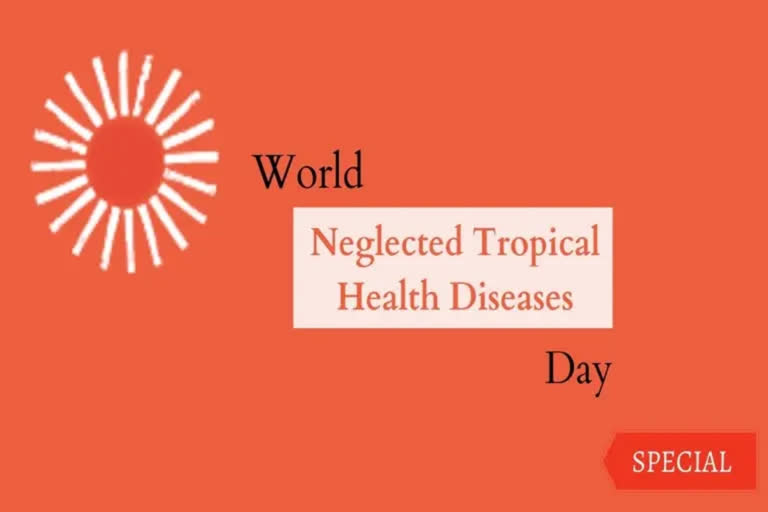Hyderabad: Most of the diseases around the world are believed to be outcomes of some or the other virus, bacteria, fungus, parasite, or coming in contact with some toxic element or chemical in one way or the other. Some of these commonly heard diseases or infections are Chikungunya, Dengue, Rabies, Leprosy or Stomach worms etc. Infections or diseases caused by these reasons are considered "neglected tropical diseases".
Neglected Tropical Diseases Day is observed on January 30th every year around the world with the aim of spreading awareness about Neglected Tropical Diseases around the world and providing means to make efforts in their treatment. Significantly, globally 20 diseases or infections are considered under the Neglected Tropical Disease or NTD category by the World Health Organization. Out of which the victims of 12 diseases are seen in large numbers in India.
Most of the cases of diseases that come under this category around the world are mostly seen in the population living below the poverty line. Because of reasons like lack of facilities related to sanitation or cleanliness, non-availability of health facilities, and disturbances in diet and water are considered responsible for their spread.
According to the World Health Organization, one out of every five people around the world, especially in Asia and Africa, becomes a victim of some kind of NTD. This day was observed by the World Health Organization for the first time in the year 2020 in tropical countries, due to the various diseases caused by the lack of quality health services, clean water and cleanliness and the problems caused by them. It was done to create awareness.
An 'NTD Roadmap' was also prepared by the World Health Organisation, under which, by the year 2030, the objective was to provide prevention and treatment of 20 diseases affecting the common people, especially the poor, to provide them with clean and potable water and health facilities, and to provide a clean and healthy environment. Along with this, some other objectives were also included in this road map, such as:
- Efforts to reduce the number of people exposed to NTD diseases by 90 per cent.
- Complete elimination of NTD diseases in at least 100 countries.
- Complete freedom from Dracunculiasis ie disease caused by Guinea worm and the chronic infection 'Yaws' in all countries.
- Reduction in cases of disability due to diseases falling in this category by at least 75 per cent.
Also read: Act Now, End Leprosy: World Leprosy Day 2023
Some of the prevalent diseases that come under the category of Neglected Tropical Diseases identified by the World Health Organization are as follows:
- Dengue, Chikungunya: Dengue and Chikungunya are diseases caused by the virus coming from the bite of a mosquito. Because of this, a large number of people lose their lives every year.
- Dracunculiasis: It is caused by a Guinea worm or parasite. This chronic infection spreads through the use of infected and unclean water.
- Leprosy / Hansen's disease: Leprosy is a long-term or chronic disease caused by the bacteria Mycobacterium leprae and Mycobacterium lepromatosis.
- Chagas disease: This disease occurs due to the bite of an insect called Triatomine, which is also known as a kissing bug. Chagas disease can happen to anyone.
- Rabies: This disease is caused by a virus called rabies, which is usually caused by the bite of infected animals, especially dogs.
- Elephantiasis / Lymphatic filariasis: This disease, popularly known as "Hathipaon" in India, is also caused by mosquito bites. In this disease, there is excessive swelling of the hands, testicles, breasts and genitals.
- Buruli Ulcer: It is also called Barnsdale ulcer or Searles ulcer. This infectious disease is caused by Mycobacterium ulcerans.
- Echinococcosis: Echinococcosis is a serious infection caused by the tapeworm parasite. It mostly spreads through dogs and wild animals.
- African trypanosomiasis or sleeping sickness: This is a parasitic disease occurring in humans and animals, which is caused by a species of parasites, Trypanosoma bruce. It is spread by the bite of an infected Tsetse fly.
- Mycetoma: Mycetoma or fungal tumour is caused by fungus or bacteria, which mainly affects our skin.
- Onchocerciasis: It is also known as river blindness and Robles disease. This disease is caused by the spread of parasitic worms on the bite of the black fly of Simulium species.
- Schistosomiasis: This disease is also known as Bilharzia, snail fever and Katayama fever.
- High soil-transmitted helminthiasis: Higher soil-transmitted helminthiasis or STH is a disease or infection caused by parasitic worms.
- Trachoma: Trachoma is a disease of the eyes caused by infection with a bacterium called 'Chlamydia trachomatis'. Due to the roughness of the skin inside the eye, pain in the eye or damage to the cornea or even blindness can occur.
- Kala-azar / Leishmaniasis: It is a slowly developing disease caused by a single-celled parasite of the genus Leishmania. Kala-azar, post-dermal leishmaniasis is a condition when lichen moves into the skin cells and develops while still there. These are prepared in the form of dermal lesions.
Apart from this, there are other diseases including snakebite, fascioliasis, cysticercosis, food-borne trematodiasis and neurocysticercosis and yaw disease which come under the NTD category. According to doctors, if the symptoms of infection or disease are detected at the right time, complete treatment of almost all the diseases that come under Neglected Tropical Diseases is possible. But to avoid the diseases that come under this category, it is very important to take care of the cleanliness and hygiene of the environment and your surroundings along with water and diet.



